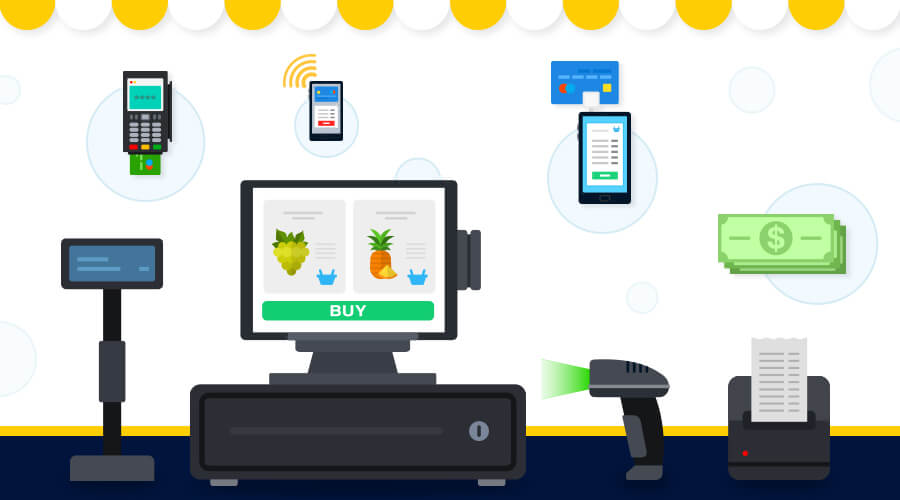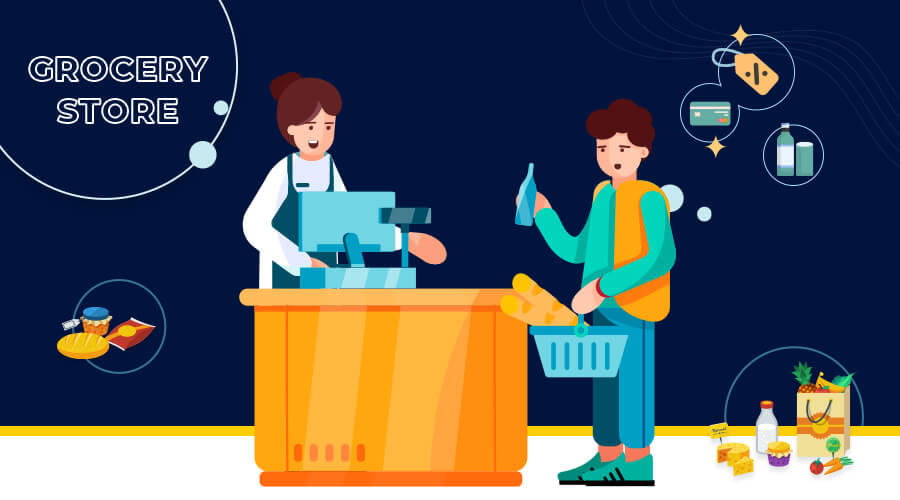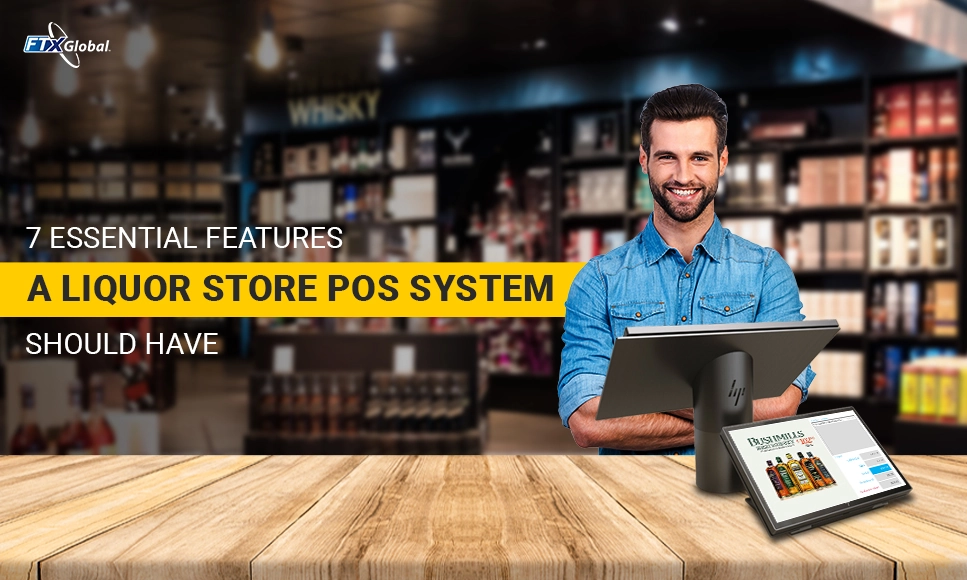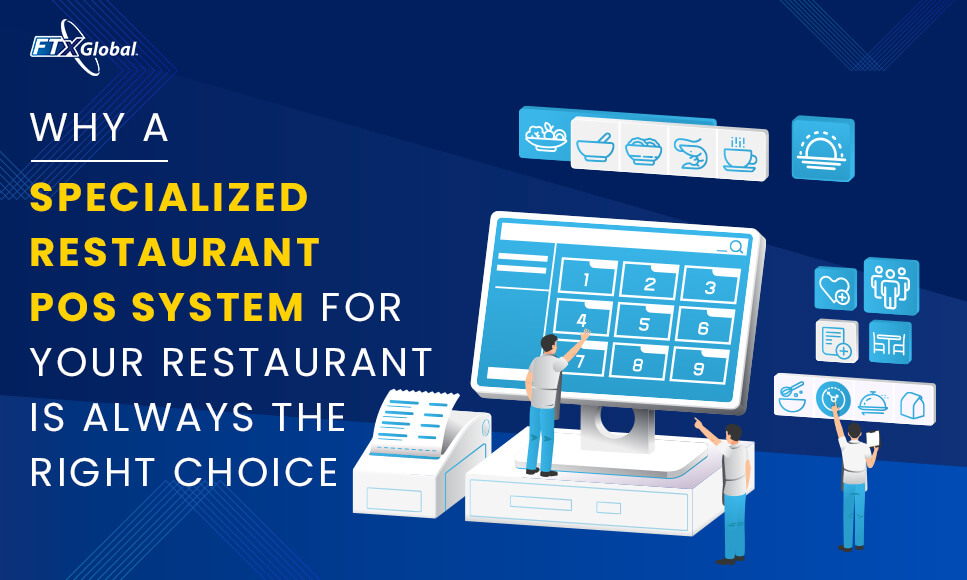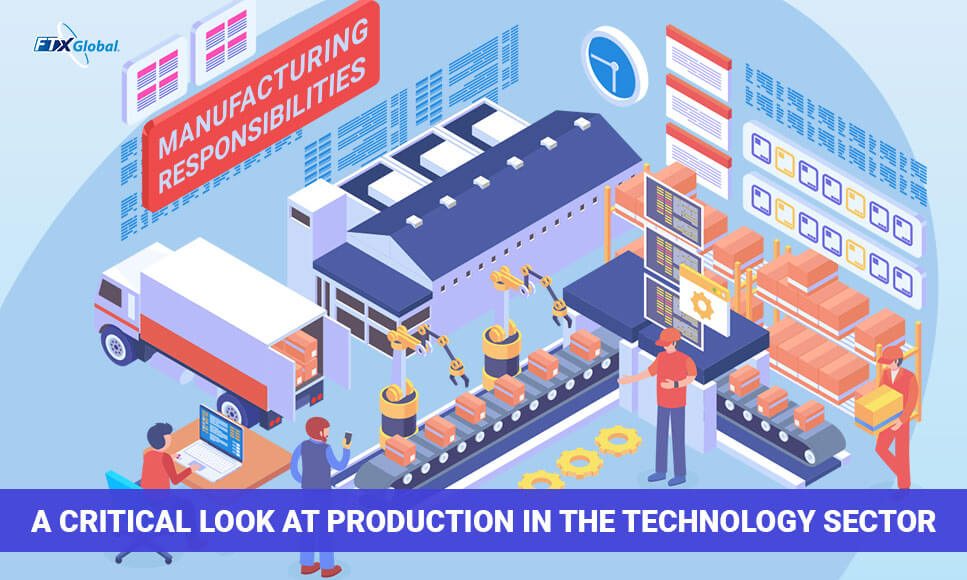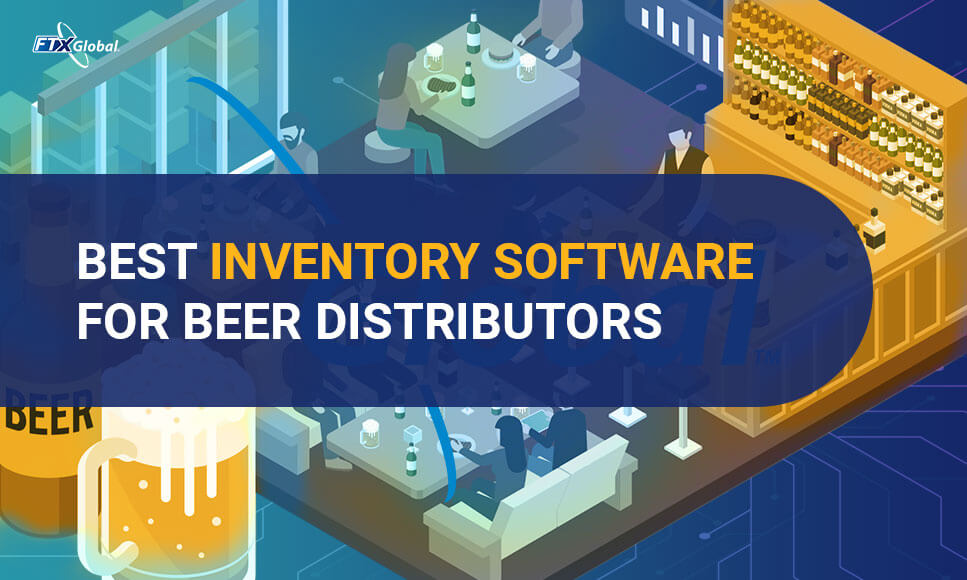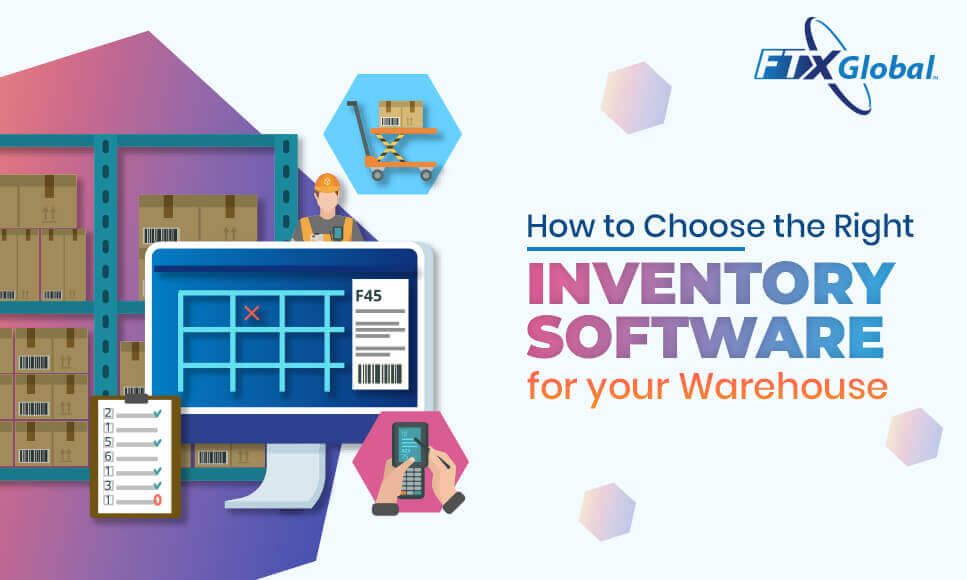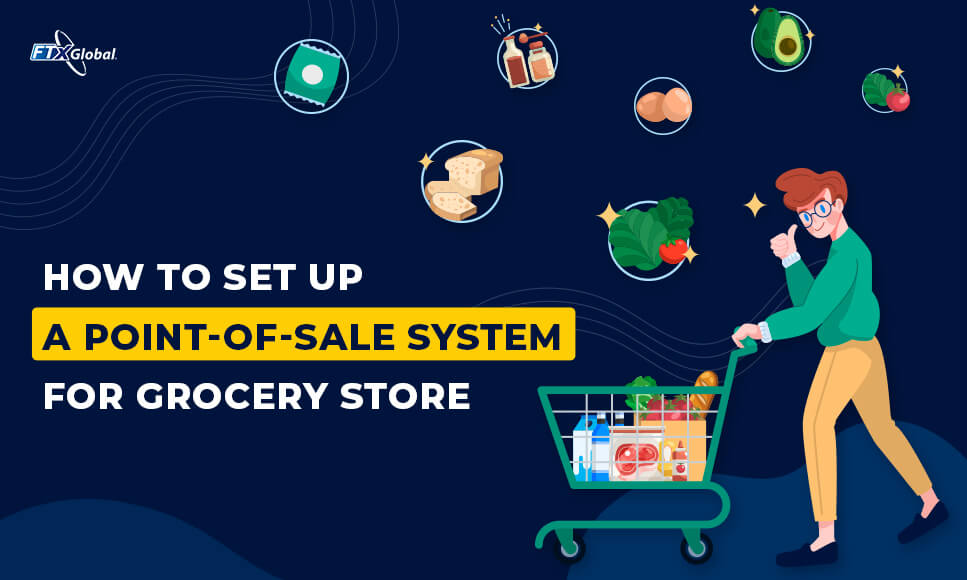
How to Set Up a Point-of-Sale System for Grocery Store?
Nowadays, customers are looking forward for a fast, hassle-free and customized shopping experience. This can be achieved through POS Systems, which offer the best solution to fulfill customers demand and offer seamless way of shopping. In this blog, we will discuss the role of POS systems, their significance, how to set up POS systems for a grocery store, and the growing demand for an omnichannel approach combined with POS Systems. Read on to know more.
What is Point of Sale (POS)?
It refers to the place where a customer carries out payment for goods/services in a retail transaction. When a customer walks up the counter or check online to buy an item from your booth/stand, it is counted as the point of sale. A POS can be a physical or virtual place where a sales transaction occurs between a consumer and the buyer. In a store, POS is a place where checkout happens, orders are processed and payment is made.
What is a Point-of-Sale System?
A POS System can be defined as an overall hardware and software system used for billing purposes in an offline store. It comprises units for displaying product weight, total orders made, and other hardware units, namely printer for receipts, cash register and hardware units for barcode scanning. These systems have been around for a while as they are worthy of investment. For this reason, several stores are opting for POS Systems to carry out their routine operations. A good POS system functions as the heart of any online store or business. With these system’s evolution, they have become more effective and are offer considerable benefits to the store owners.
What is the benefit of having a POS System in place?
Having the right POS System for your store or business can help you eliminate manual entries and reporting errors. With a POS system, you can have key insights about your customers, their buying behavior, inventory level and why more supplies should be ordered. There are several benefits of having a POS system, like it automates routine tasks, records daily sales receipts and tracks inventory. Besides it helps streamline your business operations, analyze sales data and automate different processes like inventory control, customer management (loyalty programs), marketing outreach and a lot more.
Following are some useful benefits of POS System for Grocery Store:
- Facilitates inventory tracking
- Enhances customer experience
- Allows retailers to operate from multiple locations
- Assures customer data security
- Offers detailed report on purchase and sales
- Speeds up the product return process
- No-contact contactless transaction
Types of POS Systems
There are 2 types of POS Systems: On-premise & Cloud-based POS Systems. Let’s understand about them in brief:
- On-premise POS System:
Also well-known as traditional or legacy POS, this type of Point-of-Sale system includes both hardware and software. The software is installed and kept on a server located in your physical location. Depending upon your business requirements, you can set up more than one terminal. - Cloud-based POS System:
Also termed a web POS system, the best thing about this system is that it combines both the features and power of an on-premise POS and inherits the benefit of cloud-based storage. It leads to ease of use and makes it more reliable compared to its counterpart. The installation of cloud-based POS takes place in the remote data centers of POS providers. - Open-source POS System:
This type of POS System allows you to modify and customize POS Software as per your specific needs. Even though initially it would be cost-effective, but it needs maintenance and updations over time. Therefore, this type of POS System is ideal for large-size businesses or probably for small-scale businesses, which require more customization. - Omnichannel POS System:
This type of POS System allows you to operate your business across different platforms in either offline or online mode. Data gets synced and updated automatically in real-time to ensure consistency and offer a seamless experience for customers.
POS System for Grocery Store
If you own a grocery store, you would require Grocery Store Point of sale systems that can easily take care of different activities. These activities can handle large volumes of perishable inventory, track and manage store employees and maintain customer loyalty with CRM features. It has been observed that customers tend to spend more when they make any purchase through debit/credit cards, so markets, especially grocery stores, were the early adopters of POS systems.
How can a POS System for Grocery Store Prove Helpful to Grow its Business?
Having the best Grocery Store Point of sale systems is very crucial for the success of your business. POS Systems have great significance when it comes to facilitating payments between several businesses and their customers. Besides, these systems can manage different tasks such as tracking inventory, reading coupons, tracking consumer habits and much more.
Grocery Store POS is a must-have for all store owners who deal in the selling of grocery products. The best thing is that these systems can be integrated with other systems. Having information such as when and which products are being sold can be of great help for businesses to understand consumer behavior and cater to their requirements in the best possible way.
Suppose you are operating a grocery retail store but are not doing business online. In that case, you will face a huge loss as several ubiquitous competitors out there have launched their grocery stores online. But on the contrary, if you are doing business online and are not considering doing business offline, you will not reach offline customers. Therefore, it is necessary to consider both offline and online as an option to do business. In this scenario, the omnichannel solution is the best way to operate a grocery store.
How to set up Grocery store point of sale systems?
- Find the best suitable retail solution provider
Make that the POS system you opt for is the best fit for your business. If it is the best fit, approach a reliable retail solution provider to set up a POS SYSTEM for grocery stores. - Launch the Software & Login
The first thing which is required is to run the software and visit your store’s URL. A web-based software doesn’t not require any installation. If you are using an iPad, you need to download or install the application on your device. You can log in and configure your account accordingly. - Enter/Upload Your Store Products
After creating your account and logging in, you should set up your store’s inventory in your Grocery Store Point of sale systems. For few items, you can choose to enter the data manually into the system, whereas for a large catalog, you need to upload inventory details in bulk. There are modern POS solutions available too, which lets you use a CSV product list to upload inventory information in bulk. - Setting up User Accounts
With POS SYSTEM for grocery store, you can set up profiles/accounts for team members who also use the system. For example, Cashiers, Admins, Store Manager, etc. Set user permission levels to limit them from accessing certain features or information. - Setting up Hardware
Depending on your store setup, the type of equipment you will require may vary. Several devices are available such as barcode scanners, receipt printers, cash drawers, etc. You should consult with your retail solution provider to figure out an ideal device for your store. The basic step to set up involves switching on the device, connecting it to a Wi-Fi network and pairing it to your POS System. - Setting Up POS Software
After setting up the hardware, you need to set up the software too. For this, you can go to the settings menu and configure account settings as per your requirements. You can consider certain things like setting up sales tax rates, third-party integrations, customizing bill receipts with company name, logo, address and other important information like return policy. - Setting Up Payment Methods
After setting up your payment equipment to POS SYSTEM for grocery store, you need to configure software settings to recognize the payment processor. Discuss with your retail solution provider to figure out ideal steps to integrate the POS system with the payment processor. - Integrate Loyalty Programs & CRM
In a POS System, you can register customer information with their photo, address and other essential information like registration of multiple addresses, preferred delivery person, etc. You can also activate built-in loyalty programs, provide redeemable options, customize conversion rates for redeemable points and reward products to consumers. - Connect POS System with other Business Applications
You should integrate your POS SYSTEM for grocery store with apps, which you are already using. You can experience great growth and success in your retail business if the apps you are using are interconnected. You can choose to integrate your POS Software with an e-commerce platform, ERP, accounting software, loyalty programs, etc. If you are not aware of which all are apps you can connect to your POS Software, you can consult with your provider. - Training & Learning of Staff
Several POS providers offer video tutorials and product documentation to train staff members on using the POS system. Step-by-step training videos explain about the whole process such that staff gets an idea about how to use the POS system. Before the training commences, it is suggested to set up a POS system in the manner in which it will be used in the store.
What are Setup Requirements for POS System?
Set up requirements for POS system may vary, as there are several advanced POS systems offered in the market. Some systems are tablet-based and are easy to install compared to their counterparts. Setup instructions for installing a POS system are made available on their official websites. This enables you to decide whether you would be able to set up the POS system yourself or require professional assistance.
Following are hardware requirements for setting up a POS System:
- Cashwrap
- Display screen/touch screen
- Cash drawer
- Customer Facing Displays
- Barcode scanner
- Receipt Printer
- Card Readers
Role of POS System in Inventory Management POS for Grocery Store
Manually tracking and managing your inventory is a difficult task, which is tedious and time-consuming. Using the right POS SYSTEM for grocery store for inventory management is one of the best decisions a grocery store owner can make. If they don’t have a POS system in place, they would be unaware about the status of their inventory and chances are that inventory might become obsolete.
Using a POS system, you can speed up the checkout process. With a centralized database of your products, pricing and customers, you can quickly search for the products, assign a particular order to a customer and apply discounts easily. The best thing about having a POS system is that you can efficiently reduce the chance of customers leaving your store without purchasing anything. POS SYSTEM for grocery store can eliminate the need to stand in a queue for a long time to complete their purchases.
Following are noteworthy benefits of using POS Systems for inventory management:
- Tracks inventory level
It helps keep track of inventory so that you can know which products to order. Maintaining appropriate inventory levels helps in reducing buying costs too. - Generates reports automatically
You can generate sales and inventory reports for any time period and get a fair knowledge about sales performance and inventory levels - Increases business profitability
When ordering inventory costs get reduced, it helps increase business profitability - Handles remote management
If a store has multiple locations, the owner need not worry about inventory theft or anything pertaining to inventory as the POS system keeps track of it - Dynamic inventory management
The use of POS systems allows the business owner to make use of a perpetual inventory system
Follow Omnichannel Approach for Setting Up a POS System
Engaging customers through the digital revolution has become the current trend among stores worldwide. Internet, digital communication, online ordering facility and social media have created a huge impact on how customers perceive and experience any brand. Omnichannel is all about engaging customers wherever they are and offering them excellent shopping experience at every touch point. These touch points can be mobile phone, website, brick-and-mortar store, mobile app, online marketplaces, email, catalog, social media or chat/push notification/mobile message.
Traditional POS has its limits, but with omnichannel POS systems, it’s a different ball game together. Omnichannel POS systems too have tools and software solutions that offer single stock display across different sales channels, integrate product information and stock levels, update online catalogs. They offer flexible fulfillment options like ‘Buy Online, Pickup in Store’. This allows you to offer a rich and personalized shopping experience to your customers.
The omnichannel approach will soon blur the lines between an online and offline shopping experience. With it, your customers can have a hassle-free shopping experience and can leave the store satisfied with their purchases. Grocery stores need to adjust themselves to the advanced developments and should develop an integrated omnichannel strategy to integrate essential solutions with sales channel integration. This will help them achieve effective brand visibility and offer added value to their customers over their counterparts.
When stores follow the omnichannel strategy, they are sure to offer their customers the best digital experience, whilst enriching brand image and offering personalized service to their customers via employees connected online.
Having actionable data can help a business to understand about its strong areas and where it is lacking. It is important to have a complete visibility of the entire buying process/journey of a customer for every stage. This is where omni-channel retail management comes into the picture.
Benefits of Omni Channel Approach for Grocery Store POS
There are 5 key benefits of going omnichannel with POS SYSTEM for grocery store:
-
-
- Increased Customer Loyalty
It helps keep track of inventory so that store owners can know which products you need to order. This helps in reducing buying costs.
By adopting an omnichannel approach, grocery stores can retain customers by giving them the freedom to shop from multiple channels. It paves way to customized shopping experience and increased customer satisfaction too. - Price Flexibility
Customers are ready to shell out more money if the seller offers them a customized buying experience. This means grocery stores can offer the best quality of products and high level of customer service without worrying about costs. This will pave way for great possibilities for creating pricing strategies. - Increased Profits
Offering the best customer experience can result in a great business and on your revenue too. With an omnichannel strategy, you can improve customer experience and in turn, can attract customers and do great business. - Inventory Management
As omnichannel POS Systems share stock-related data across multiple channels, it avoids the risk of inventory being stagnant for a long period of time. It helps in effective inventory management and lets you know the current status of inventory. - Upsell/Cross-Sell Opportunities
With an omnichannel strategy, customers can get access to data, grocery stores can send emails, text, push notifications and direct mail of recommendation upgrades and complementary items.
- Increased Customer Loyalty
How to Create an Omnichannel Strategy POS for grocery store?
The first step to set up an omnichannel strategy is to integrate your online store with a POS System. E-commerce platforms and online stores use POS systems to process orders, manage inventory and track sales data. With e-commerce POS integration, online businesses or stores can boost their sales and revenue. An omnichannel strategy helps in enhancing customer shopping experience in a remarkable way.
As per Harvard Business Review, about 73% of consumers use multiple channels to purchase any product throughout the whole purchase cycle. As per study conducted by Harvard on 46,000 customers, omnichannel customers will buy more than single-channel customers. With an omnichannel shopping experience, online stores and businesses can increase sales, attract more customers and offer the best customized shopping experience. POS Software integration with e-commerce paves the way for omnichannel. Ecommerce POS integration helps in managing all online and offline stores and helps in delivering personalized shopping experience.
Why You Should Bank on FTx POS Systems?
-
-
- Easy to use be, it front-end or back-end
- Order, sales and inventory management from a single portal
- Delivers contactless billing and payment experience
- Enhances customer experience and builds brand awareness
- Tracks, records and analyzes business transactions
- On-demand integrated payroll and accounting management services
- It has features like age verification, confirmation and age requirement for store retailers like cigar, tobacco, liquor and vape
- We offer omnichannel assistance for online businesses
- Specialized POS systems for different states with different laws
- ID scanner comes integrated into our POS systems to automatically scan driver’s license
- Helps in detecting fake IDs
- Automated layout to have control on the amount of information you want to share with users of the POS system
- Training of staff via video tutorials and step-by-step documentation to use POS system
- Get 24 x 7 technical support for your queries
-
Final Thoughts
Store owners should consider investing in an efficient POS SYSTEM to manage their routine tasks in a seamless way. It is essential for grocery store owners to embrace the benefits of omnichannel approach and POS Systems. It will help them maintain a competitive edge and offer the best shopping experience to customers. Thus, POS systems help simplify process of routine tasks for grocery store owners.
-



